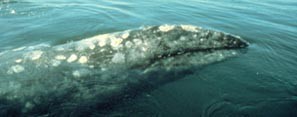|
To counter our claim that the MMPA's prohibition against hunting marine mammals should apply to the Makah, the tribe maintains that its 1855 treaty, the Treaty of Neah Bay, expressly preserves its right to whale. However, the treaty does so "in common with all citizens of the United States," the appeals court judges noted, quoting from the treaty itself. They further wrote:
The Tribe has no unrestricted treaty right to pursue whaling in the face of the MMPA. Instead, having concluded that the MMPA is applicable to regulate the Tribe's whaling because the MMPA's application is necessary to effectuate the conservation purpose of the statute, and because such application is consistent with the language of the Neah Bay Treaty, we conclude that the issuance by NOAA [the National Oceanic and Atmospheric Administration, which is the parent agency of NMFS] of a gray whale quota to the Tribe, absent compliance with the MMPA, violates federal law.
In short, while the court did not rule that the Makah lacked a treaty right to hunt whales, it held that the Makah must comply with the MMPA if they wish to pursue any such right. Under the MMPA, entities may apply for waivers to the law's prohibitions. The court has ordered the Makah to follow the MMPA's waiver procedures before proceeding with their hunt.
The Makah and their attorneys have stated in the media that this ruling will have damaging implications for treaty rights across the board. They claim that this ruling will be used to negate treaty rights. This is not the case. The MMPA has specific procedures that allow tribes to exercise their treaty rights to hunt marine mammals. This ruling in no way negates those rights. It does, however, go a long way toward ensuring that strong conservation principles will govern the exercising of those rights, which anyone who respects the environment should approve.
Opposing the Hunt, Not the Makah
The HSUS has opposed the Makah hunt from the beginning, not because we oppose native treaty rights or even the aboriginal subsistence hunting of marine mammals. The HSUS does not oppose the Makah or Makah culture. However, says HSUS marine mammal scientist Dr. Naomi Rose, "We do oppose any killing of marine mammals when it is done in an inhumane manner."
"We also oppose marine mammal hunts when they do not meet clear subsistence needs—that is, when it is for commercial, sport, or other non-subsistence purposes. We oppose any hunting that is not in compliance with the strong conservation principles this country included in its landmark environmental laws of the late 1960s and early 1970s. And we oppose all whaling that is not in compliance with our international treaty obligations," Rose continues.
The HSUS has worked for decades at the international level to improve the humaneness of aboriginal subsistence whaling and to minimize the quotas needed to meet subsistence needs. NMFS's campaign to classify the Makah hunt as aboriginal has been nothing more than a blatant effort to circumvent NEPA and the MMPA.
Rose notes that The HSUS has tried to work with the Makah. "We have continued to maintain a dialog with the Makah regarding the hunt," she says. "We know the hunt is not, in fact, universally supported within the tribe. We respect the Makah's culture, history, and treaty rights, but we also respect our present-day environmental laws and international treaty obligations, and insist that federal agencies do as well."
|
